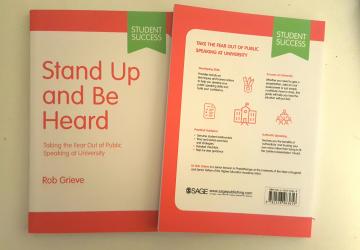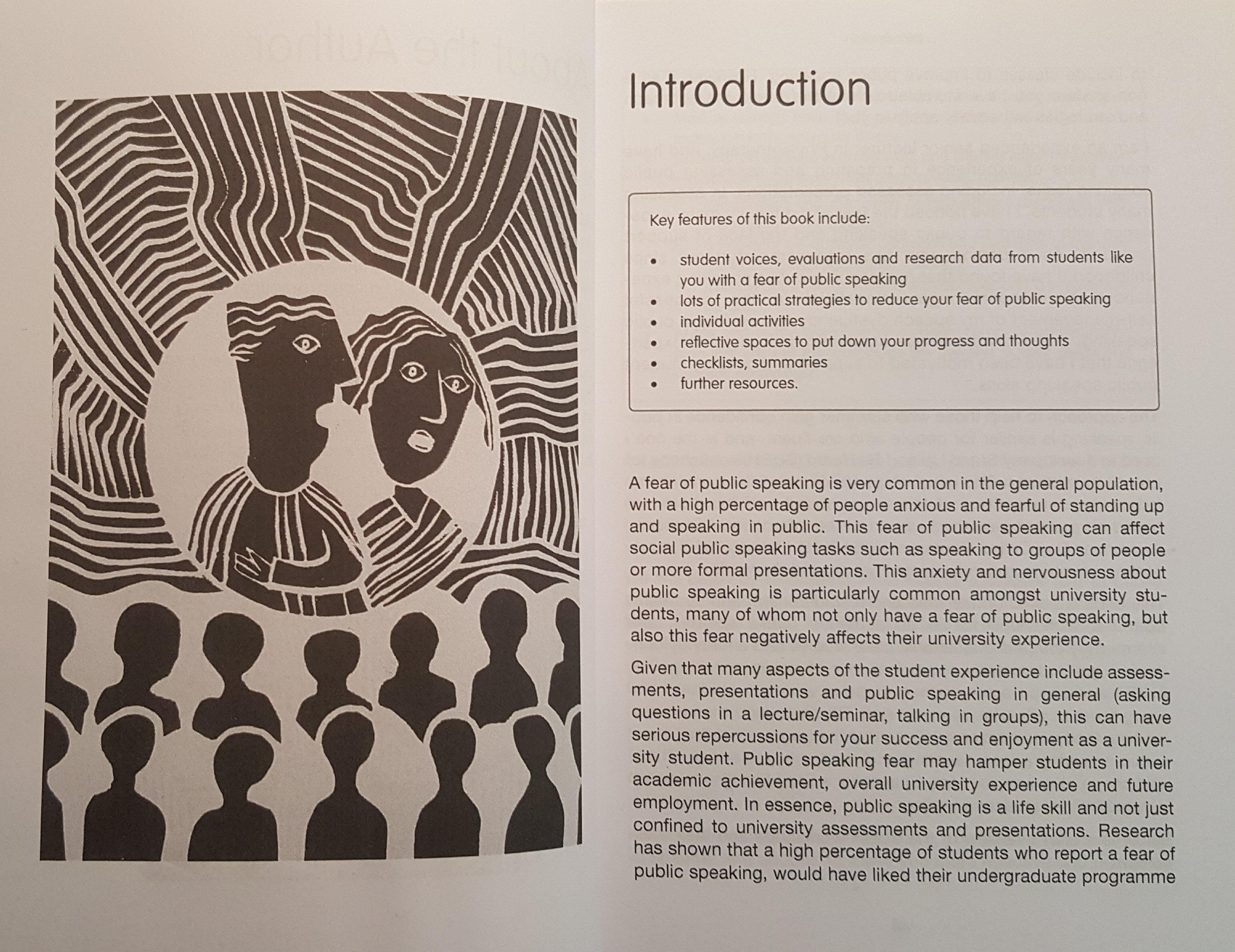
Book review: 'Stand Up and Be Heard'
1st December 2020
Details and review of a new self-help book for students and anyone else with a fear of public speaking.

'Stand Up and Be Heard: Taking the Fear Out of Public Speaking at University', is a new publication by Rob Grieve, a senior lecturer in physiotherapy at the University of the West of England and former Stamma Trustee. You can scroll down to read the review, but first, here's a little bit about the book itself.
Author Rob says, "As an academic with a stammer I have faced many issues in public speaking. But during my teaching career I noticed how many students, regardless of their fluency, had a fear of it too. The idea for the book came originally from a paper I wrote on stammering and public speaking (which you can read here), which led me to set up and run workshops on public speaking for students in 2016. Then I decided to write a book about it."
He adds, "This book is suitable for anyone who may have a fear of public speaking, not just students or those who stammer. In it I try and move away from focusing on perfection or on fluency, instead taking an 'authentic approach' to public speaking, which has helped me in relation to my stammer in my many years of teaching.

'It’s full of voices from real people and has strategies related to public speaking, practice and resources. I feel strongly that the approach taken in the book will be of definite benefit and interest to people who stammer."
Review
By Jon Horne, Stamma's volunteer librarian.
Rob Grieve is a lecturer at the University of the West of England, where in addition to his regular work, he was the recipient of the 2017 Staff Excellence Student Enabling Award for his Stand Up And Be Heard workshops, helping students take on public speaking. (In the interests of transparency, as stated above, he is also a former Trustee of Stamma.)
His book is an expansion of these workshops, and generally follows the structure of a workshop, with space provided early in each chapter for readers' notes before dealing with a topic, and space at the end for written reflection.
Grieve has what he describes as 'a mild stammer', which affects his public speaking and provided the impetus for his work in this area. This is not, however, a book written for stammerers, and should not be read as such. It is a self-help book designed for students which, despite a few paragraphs that are exclusively about the student experience, is just as relevant for the workplace.
Authenticity
In eight chapters of tightly structured, deliberately repetitive prose, Grieve urges the potential public speaker to be 'authentic at all costs'. By 'authentic', he means concentrating on content over style, knowing the subject, preparing and practising, and above all, 'letting go of perfection'.
The 'perfection' he speaks of — a slick delivery with little hesitancy, that the speaker might hear in her or his head as the ideal delivery of a presentation — is both unachievable (from the point of view of the speaker; s/he will always hear the imperfection, the cough, the 'um' and 'ah', the stammer) and undesirable, since it leads to a sterile 'performance' that fails to engage the audience.
The book will encourage you to remember the point of public speaking, which is to inform and entertain, to pass on information; to remember an audience is no more interested in the fluency of a speaker than they are in his/her accent or dress sense.
A piece of advice that Grieve repeats over the course of the book is for the speaker to consider at all times the needs of the audience. At first sight, this contradicts the idea of authenticity, but in fact this is central to the concept of Stand Up And Be Heard, which is that content is everything. The point in public speaking is to give the audience what they need, in whatever way the speaker is able. If the audience comes away from a lecture or presentation with the information they require, then you have succeeded. If you have worn the right clothes, spoken fluently throughout, cracked jokes like a pro, but not given them what they need, then you haven't. Authenticity, in this context, is the successful delivery of content.
Rather brilliantly, Grieve provides advice on giving talks that you don't want to give, on subjects that you don't care about, without compromising on authenticity. He speaks of trying to achieve a 'congruency' between verbal delivery and non-verbal signals. Occasionally this can veer into the Hucksters trope of: "Sincerity — fake that and you’ve got it made," but mostly the advice is sound and workable, always focusing on the speaker’s relationship with the audience: they want to hear what you have to say, and that is where 'authenticity' is located.
In the introduction to the book, Grieve talks about an academic presentation he gave early in his career in which he blocked slightly on his own name, causing one of the listening professors to laugh out loud. He then opened up about his speech. The person who had laughed spoke to Grieve later and explained that he thought he was choking on a biscuit.
Encouragement
Many people reading this review will not have to tell an audience in advance that they have a stammer. If you are someone who would most likely experience a block as soon as you open your mouth, and would love to able to do what Grieve did and say your own name with just a single repetition, this is not a book to help you get past that. What it will do is encourage you to remember the point of public speaking, which is to inform and entertain, to pass on information; to remember an audience is no more interested in the fluency of a speaker than they are in his/her accent or dress sense, provided that the information is being conveyed.
Although it is sometimes too close to its origins in workshops — I could do without the bland 'student voices' near the end of ever chapter, which repeat what Grieve has said just before he repeats it himself in the chapter summary — this a thoroughly useful and valuable book. It is clear, well presented and always practical; the penultimate chapter on practice methods is particularly helpful. The book is readable in a day, but the lessons learned could start the reader on a path that lasts a lifetime.
'Stand Up and Be Heard: Taking the Fear Out of Public Speaking at University', the 160-page book, is published by SAGE Publications. You can buy it in paperback from Waterstones, or in hardback, paperback or on Kindle from Amazon.

































